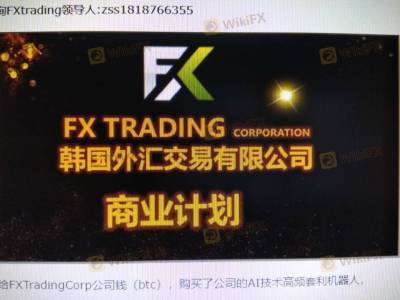Is FX-TRADING safe?

Business

License

Is FX-Trading A Scam?
Introduction
FX-Trading, a broker operating in the foreign exchange market, has garnered attention for its competitive offerings and broad range of trading instruments. Established in 2014 and based in Australia, FX-Trading provides traders access to various financial products, including forex, CFDs, and cryptocurrencies. However, with the increasing prevalence of online scams in the financial sector, it is crucial for traders to carefully assess the credibility of their chosen brokers. This article aims to explore whether FX-Trading is a scam or a legitimate trading platform. Our investigation utilizes a comprehensive evaluation framework that examines regulatory compliance, company background, trading conditions, customer experiences, and risk factors.
Regulation and Legitimacy
The regulatory status of a broker is a fundamental aspect that determines its reliability. FX-Trading is regulated by the Australian Securities and Investments Commission (ASIC) and the Vanuatu Financial Services Commission (VFSC). Regulatory oversight is vital as it ensures that brokers adhere to specific standards that protect traders. Below is a summary of FX-Trading's regulatory information:
| Regulatory Authority | License Number | Regulatory Region | Verification Status |
|---|---|---|---|
| ASIC | 40256 | Australia | Verified |
| VFSC | N/A | Vanuatu | Verified |
ASIC is recognized as a top-tier regulator, imposing stringent requirements on brokers to ensure transparency and client protection. In contrast, the VFSC is considered a less robust regulatory environment, which may raise concerns about the level of oversight for traders outside Australia. Overall, while FX-Trading is regulated, the dual regulatory framework indicates a mix of strong and weaker oversight, which traders should consider when evaluating its safety.
Company Background Investigation
FX-Trading, formerly known as Rubix FX, has evolved since its inception in 2014. The company was founded by a group of professionals with extensive experience in financial markets, risk management, and technology. This management team brings a wealth of expertise, which is crucial for establishing a trustworthy trading environment. Transparency is essential in the financial industry, and FX-Trading appears to maintain a reasonable level of disclosure regarding its operations and management.
The company's ownership structure is not entirely transparent, as detailed information about the principal stakeholders is not readily available. However, the company's commitment to transparency and integrity is evident in its operational practices and customer service approach. With a focus on innovation and diligence, FX-Trading aims to provide a secure trading experience for its clients.
Trading Conditions Analysis
Understanding the trading conditions offered by a broker is essential for evaluating its overall appeal. FX-Trading provides a competitive fee structure that includes variable spreads, with no commissions on standard accounts. However, the pro account does incur a commission. Below is a comparison of FX-Trading's core trading costs with industry averages:
| Fee Type | FX-Trading | Industry Average |
|---|---|---|
| Major Currency Pair Spread | 0.6 pips (EUR/USD) | 1.0 pips |
| Commission Model | $2 per lot (Pro) | $5 per lot |
| Overnight Interest Range | Variable | Variable |
The average spread of 0.6 pips on the EUR/USD pair is competitive compared to the industry average of 1.0 pips. However, traders should be cautious of the potential for hidden fees, especially regarding withdrawals and international transfers. Overall, FX-Trading's fee structure appears reasonable, but traders must remain vigilant for any unusual charges.
Customer Funds Safety
The safety of customer funds is a critical concern for any trader. FX-Trading employs several measures to ensure the security of its clients' funds. Client funds are held in segregated accounts at tier-1 banks, which means that they are kept separate from the company's operational funds. This segregation is a crucial safety feature, as it protects traders' funds in the event of the broker's insolvency.
Additionally, FX-Trading offers a negative balance protection policy, ensuring that clients cannot lose more than their initial deposits. This feature is particularly important in the high-risk environment of forex trading, where leverage can amplify both gains and losses. Historical data does not indicate any significant issues regarding fund safety at FX-Trading, which adds to the broker's credibility.
Customer Experience and Complaints
Customer feedback is an essential aspect of evaluating any broker. FX-Trading has received mixed reviews from users, with some praising its user-friendly platform and responsive customer service. However, common complaints include issues related to withdrawal processes and customer support response times. Below is a summary of the main complaint types and their severity:
| Complaint Type | Severity Level | Company Response |
|---|---|---|
| Withdrawal Issues | High | Slow response time |
| Customer Support Delays | Medium | Generally responsive |
| Platform Stability | Low | Generally stable |
One notable case involved a user who reported difficulty withdrawing funds after a trading session, leading to frustration. The company eventually resolved the issue, but the delay highlighted potential weaknesses in their support system. Overall, while FX-Trading has a solid reputation, it is crucial for prospective traders to be aware of these complaints and exercise caution.
Platform and Execution
The trading platform's performance is vital for a seamless trading experience. FX-Trading offers the popular MetaTrader 4 (MT4) platform, known for its stability and user-friendly interface. The platform provides various features, including advanced charting tools and automated trading capabilities. However, the quality of order execution is a critical factor that can impact trading outcomes.
In terms of execution quality, FX-Trading generally maintains good performance, with minimal slippage reported by users. However, traders should remain vigilant for any signs of platform manipulation, such as frequent requotes or execution delays during volatile market conditions.
Risk Assessment
Using FX-Trading comes with inherent risks, as is the case with any broker. Here is a summary of the key risk areas associated with trading through this platform:
| Risk Category | Risk Level (Low/Medium/High) | Brief Description |
|---|---|---|
| Regulatory Risk | Medium | Dual regulation may lead to varying levels of oversight. |
| Withdrawal Risk | Medium | Complaints related to withdrawal delays. |
| Market Risk | High | High volatility in forex trading can lead to significant losses. |
To mitigate these risks, traders are advised to start with a demo account, utilize risk management tools, and remain informed about market conditions.
Conclusion and Recommendations
In conclusion, while FX-Trading is regulated by ASIC and VFSC, the dual regulatory framework presents a mix of strengths and weaknesses. Although the broker offers competitive trading conditions and robust security measures for customer funds, some customer complaints warrant caution. Overall, FX-Trading does not appear to be a scam, but traders should approach with a degree of vigilance.
For novice traders, it may be wise to consider brokers with stronger regulatory oversight, such as IG or Pepperstone, which offer comprehensive educational resources and superior customer support. Experienced traders may find FX-Trading's competitive spreads and advanced trading features appealing, but should remain aware of potential withdrawal issues.
In summary, FX-Trading can be considered a legitimate broker, but prospective clients should carefully evaluate their trading needs and risk tolerance before proceeding.
Is FX-TRADING a scam, or is it legit?
The latest exposure and evaluation content of FX-TRADING brokers.




FX-TRADING Similar Brokers Safe
Whether it is a legitimate broker to see if the market is regulated; start investing in Forex App whether it is safe or a scam, check whether there is a license.
FX-TRADING latest industry rating score is 1.58, the higher the score the safer it is out of 10, the more regulatory licenses the more legitimate it is. 1.58 If the score is too low, there is a risk of being scammed, please pay attention to the choice to avoid.
